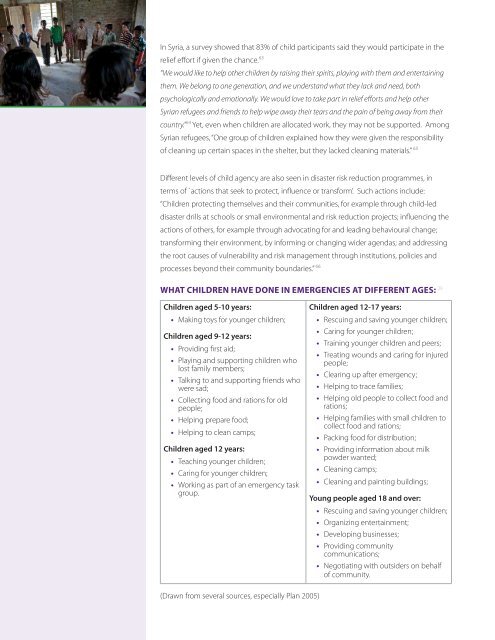putting-children-at-the-heart_full_text_final
putting-children-at-the-heart_full_text_final
putting-children-at-the-heart_full_text_final
- No tags were found...
You also want an ePaper? Increase the reach of your titles
YUMPU automatically turns print PDFs into web optimized ePapers that Google loves.
In Syria, a survey showed th<strong>at</strong> 83% of child participants said <strong>the</strong>y would particip<strong>at</strong>e in <strong>the</strong><br />
relief effort if given <strong>the</strong> chance. 63<br />
“We would like to help o<strong>the</strong>r <strong>children</strong> by raising <strong>the</strong>ir spirits, playing with <strong>the</strong>m and entertaining<br />
<strong>the</strong>m. We belong to one gener<strong>at</strong>ion, and we understand wh<strong>at</strong> <strong>the</strong>y lack and need, both<br />
psychologically and emotionally. We would love to take part in relief efforts and help o<strong>the</strong>r<br />
Syrian refugees and friends to help wipe away <strong>the</strong>ir tears and <strong>the</strong> pain of being away from <strong>the</strong>ir<br />
country.” 64 Yet, even when <strong>children</strong> are alloc<strong>at</strong>ed work, <strong>the</strong>y may not be supported. Among<br />
Syrian refugees, “One group of <strong>children</strong> explained how <strong>the</strong>y were given <strong>the</strong> responsibility<br />
of cleaning up certain spaces in <strong>the</strong> shelter, but <strong>the</strong>y lacked cleaning m<strong>at</strong>erials.” 65<br />
Different levels of child agency are also seen in disaster risk reduction programmes, in<br />
terms of `actions th<strong>at</strong> seek to protect, influence or transform’. Such actions include:<br />
“Children protecting <strong>the</strong>mselves and <strong>the</strong>ir communities, for example through child-led<br />
disaster drills <strong>at</strong> schools or small environmental and risk reduction projects; influencing <strong>the</strong><br />
actions of o<strong>the</strong>rs, for example through advoc<strong>at</strong>ing for and leading behavioural change;<br />
transforming <strong>the</strong>ir environment, by informing or changing wider agendas; and addressing<br />
<strong>the</strong> root causes of vulnerability and risk management through institutions, policies and<br />
processes beyond <strong>the</strong>ir community boundaries.” 66<br />
WHAT CHILDREN HAVE DONE IN EMERGENCIES AT DIFFERENT AGES: 39<br />
Children aged 5-10 years:<br />
• Making toys for younger <strong>children</strong>;<br />
Children aged 9-12 years:<br />
• Providing first aid;<br />
• Playing and supporting <strong>children</strong> who<br />
lost family members;<br />
• Talking to and supporting friends who<br />
were sad;<br />
• Collecting food and r<strong>at</strong>ions for old<br />
people;<br />
• Helping prepare food;<br />
• Helping to clean camps;<br />
Children aged 12 years:<br />
• Teaching younger <strong>children</strong>;<br />
• Caring for younger <strong>children</strong>;<br />
• Working as part of an emergency task<br />
group.<br />
Children aged 12-17 years:<br />
• Rescuing and saving younger <strong>children</strong>;<br />
• Caring for younger <strong>children</strong>;<br />
• Training younger <strong>children</strong> and peers;<br />
• Tre<strong>at</strong>ing wounds and caring for injured<br />
people;<br />
• Clearing up after emergency;<br />
• Helping to trace families;<br />
• Helping old people to collect food and<br />
r<strong>at</strong>ions;<br />
• Helping families with small <strong>children</strong> to<br />
collect food and r<strong>at</strong>ions;<br />
• Packing food for distribution;<br />
• Providing inform<strong>at</strong>ion about milk<br />
powder wanted;<br />
• Cleaning camps;<br />
• Cleaning and painting buildings;<br />
Young people aged 18 and over:<br />
• Rescuing and saving younger <strong>children</strong>;<br />
• Organizing entertainment;<br />
• Developing businesses;<br />
• Providing community<br />
communic<strong>at</strong>ions;<br />
• Negoti<strong>at</strong>ing with outsiders on behalf<br />
of community.<br />
(Drawn from several sources, especially Plan 2005)


